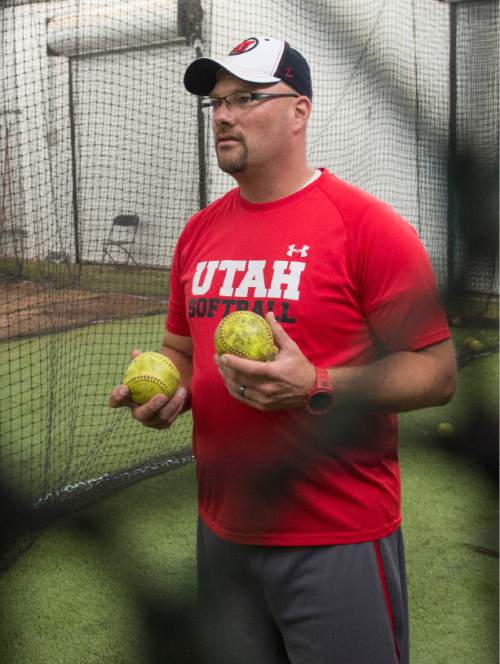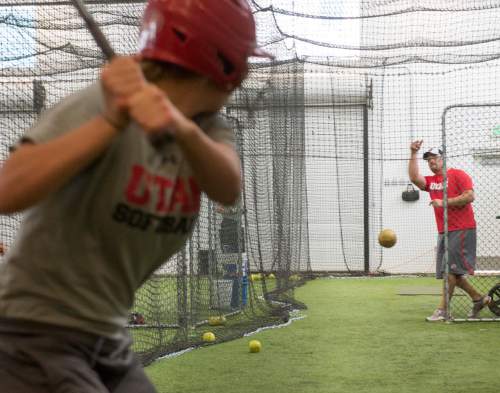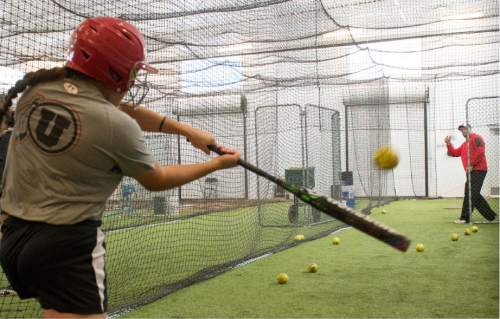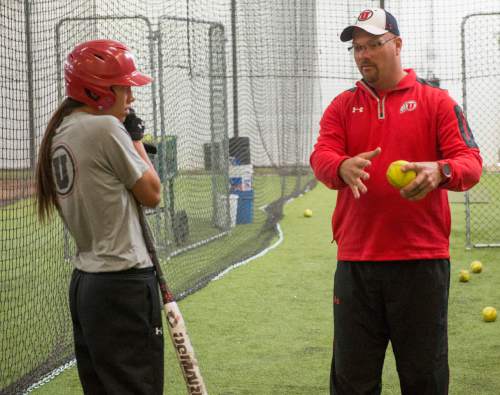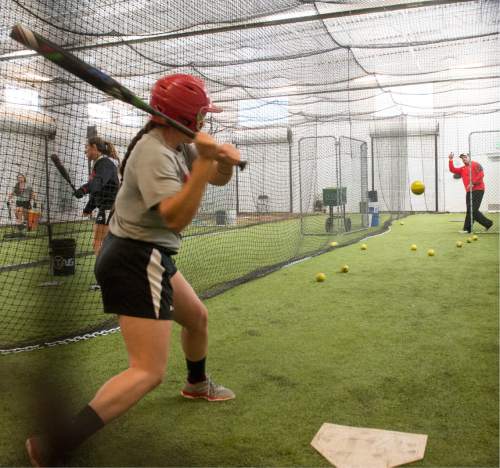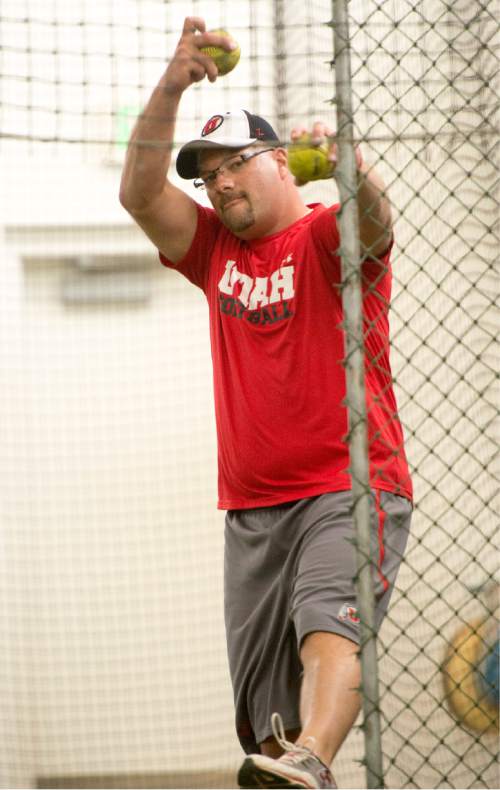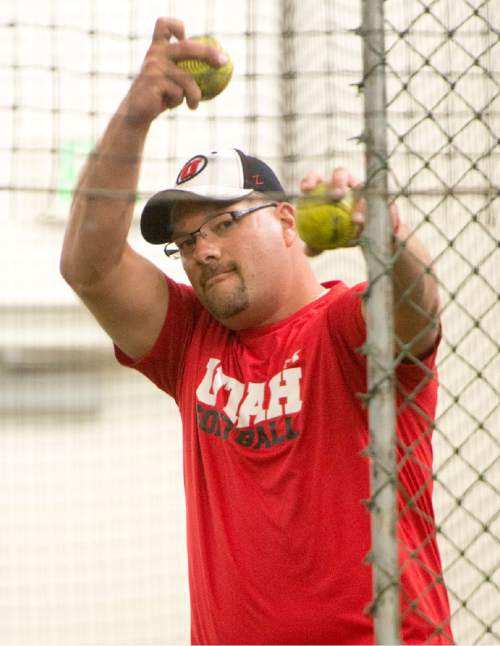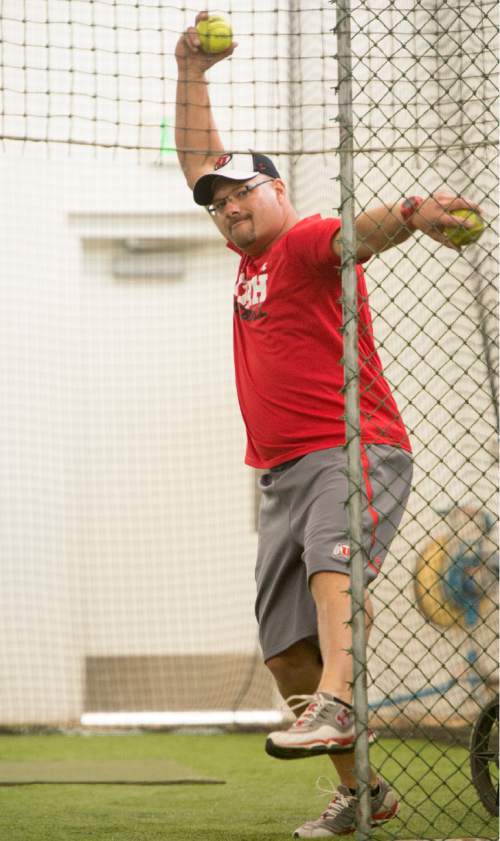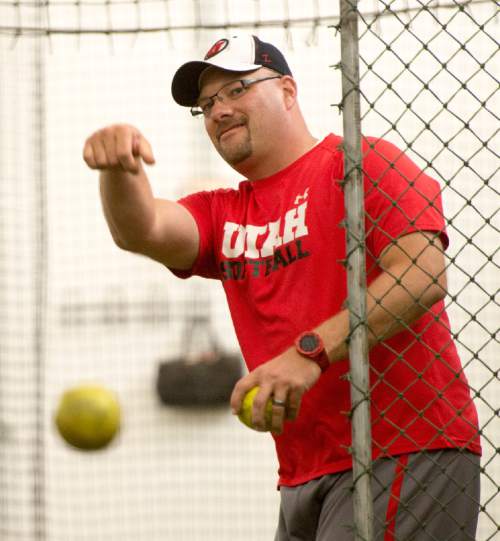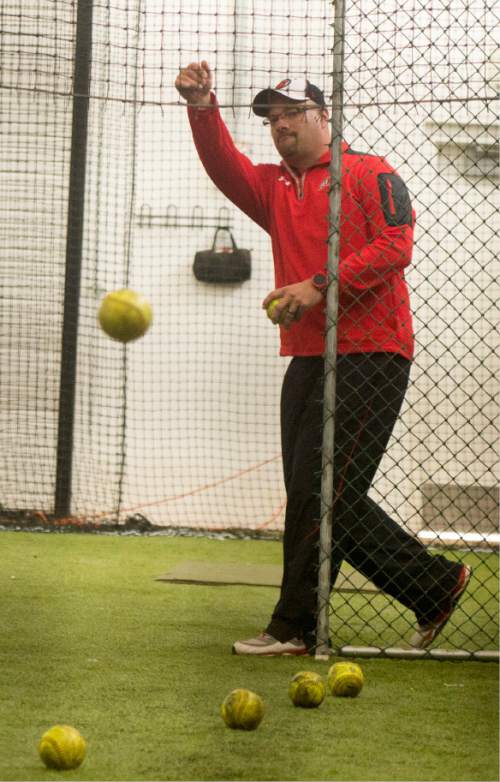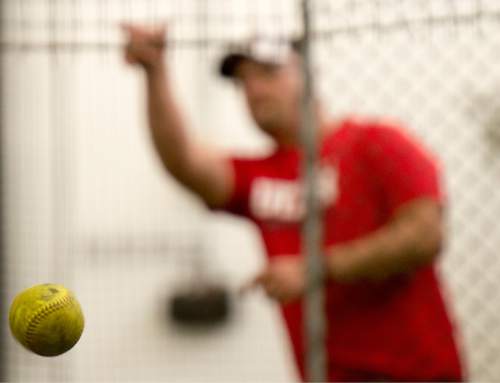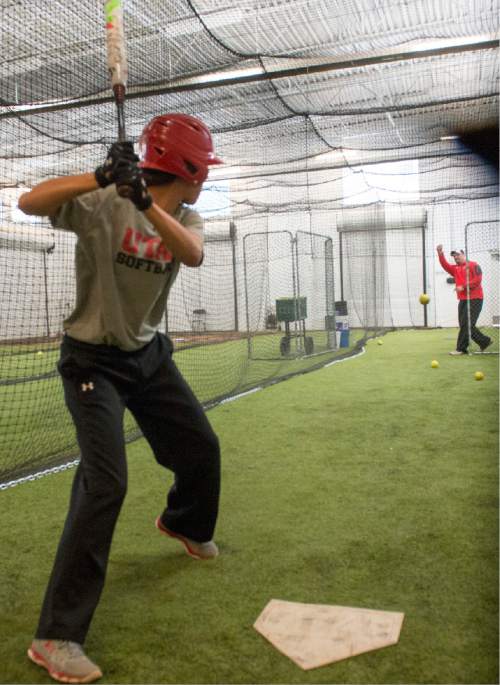This is an archived article that was published on sltrib.com in 2015, and information in the article may be outdated. It is provided only for personal research purposes and may not be reprinted.
Each stands beside a bucket of roughly 75 balls at Utah's batting cages.
Cody Thomson is Arizona's Michelle Floyd.
Amy Hogue is Arizona's Trish Parks.
Thomson/Floyd will take two light steps, throw and pivot back to the safety of the pitching screen while a line drive screams past.
Then he'll wait, and Hogue/Parks will deliver in the adjacent cage.
They'll go through a dozen buckets this way, and rarely will more than a few seconds pass between the pings of aluminum bats.
Some days Thomson will imitate the presentation of an opposing pitcher — the windup, the follow-through. Not this day. Just two steps and a release so easy it's like he's tossing a golf ball to his caddy.
Except, he's not. These are inside screwballs meant to replicate the best pitch of Arizona's best pitcher.
Hogue, Utah's head coach, releases her pitches about 10 feet closer than Thomson, nimbly escaping to the small space behind the screen between the bucket and her favored personal items.
"Give me my chapstick, my cellphone and Diet Pepsi, and I could pitch for hours," Hogue says. She jokes that she's now pitched batting practice longer than she played second base.
Few other teams at the U. demand athletic excellence from their coaches. Football safeties coach Morgan Scalley throws his share of wounded ducks during interception drills, but nobody expects him to replicate Oregon quarterback Marcus Mariota. Men's basketball associate head coach Tommy Connor will dribble and pass, but it's fine if he's not Arizona point guard T.J. McConnell.
Athletic ability is a big part of Thomson's skill set.
Even if his official title is pitching coach — and he appears to be doing a fine job, with the third-best ERA in the Pac-12 (2.72) — there's no doubting the advantage to Utah's hitters of having a former men's national team pitcher on the staff.
In fall, Thomson has thrown BP for four hours on end.
He's picked up the curveball and the screwball — not much of a factor in the men's game — and a variety of changeups.
And "Cody can throw a rise ball better than probably any girl we're going to face," said hitting coach Maggie Livreri, who tinkers with players' swings in a third cage while Hogue and Thomson alternate in what sometimes approaches 4/4 time.
Thomson is a natural softball player. His dad introduced him to the sport at a young age, and his hands are so large that he can hold three softballs in his left while he throws with his right.
He averaged about 77 mph pitching for the men's national team, but he tones it down to 60-65 mph in the cage. By comparison, legendary U.S. pitcher Jennie Finch threw mid- to high-60s.
His specialty is his accuracy, although he sheepishly admits, "I usually average one to two people a year that I hit pretty hard."
Mike White, head coach at No. 1 Oregon, was once a national team teammate of Thomson's. Washington recently pried away accomplished New Zealand pitcher Mike Roberts from White's staff to serve as its pitching and catching coach. But few other coaches possess Thomson's ability.
"When you're hiring, especially, it's important," Hogue says. "And if you can spin it, you're a hot commodity, for sure."
Thomson began throwing batting practice at Utah to stay in shape while he was with the national team (and owner of a heating and air conditioning business) from 2004 to 2009. He was hired full-time four years ago.
The father of four is especially grateful for the new cage's "windshield," a section of netting that hangs in front of the pitching screen and protects him from head-high line drives or balls that bounce down off the top netting.
Those could hurt, he said.
But there's still a risk of "Plinkos," as Hogue calls it when a hard-hit ball ricochets off another lying near them. Or "shrapnel," when they pitch outside and infield sand sprays into their faces.
The worst pain, Thomson says, came when he was drilled in the ankle about five years back.
And then there are the callouses he gets from throwing upward of 300 pitches in a day, and the cuts from the strings on the ball.
He doesn't complain, though. At least not on this day.
Senior outfielder Kate Dickman, leading the team with a .420 average, asks him as she steps in for another session, "Are you good, Coach T?"
"I'm great," he tells her.
"We can stay as long as you need."
Twitter: @matthew_piper —
Utah vs. No. 16 Arizona
At Dumke Family Stadium (Utah Softball Stadium)
When • 5 p.m. Friday (Power of Pink), 4:30 p.m. Saturday, noon Sunday
TV • Pac-12 Networks
About Utah (29-13, 7-8 Pac-12) • After an 0-6 start to conference play that included sweeps by No. 1 Oregon and No. 8 UCLA, the Utes have won their past three series, earning their first ever Pac-12 road sweep last weekend against Oregon State. The Utes are last in the conference in batting average and runs scored, but they've scored five or more runs in eight of their last nine and rank third in ERA (2.72) and first in fielding percentage (.978).
About Arizona (33-10, 8-4 Pac-12) • The Wildcats have more than twice as many home runs as the Utes — 71 to 28 — and feature two USA Softball player of the year candidates in senior shortstop Kellie Fox (.424, 10 home runs, 51 RBIs) and senior catcher Chelsea Goodacre (.349, 17 home runs, 64 RBIs). Sophomore Katiyana Mauga leads the Pac-12 in home runs, with 19. The Wildcats' 3.72 ERA ranks fifth in the Pac-12.


